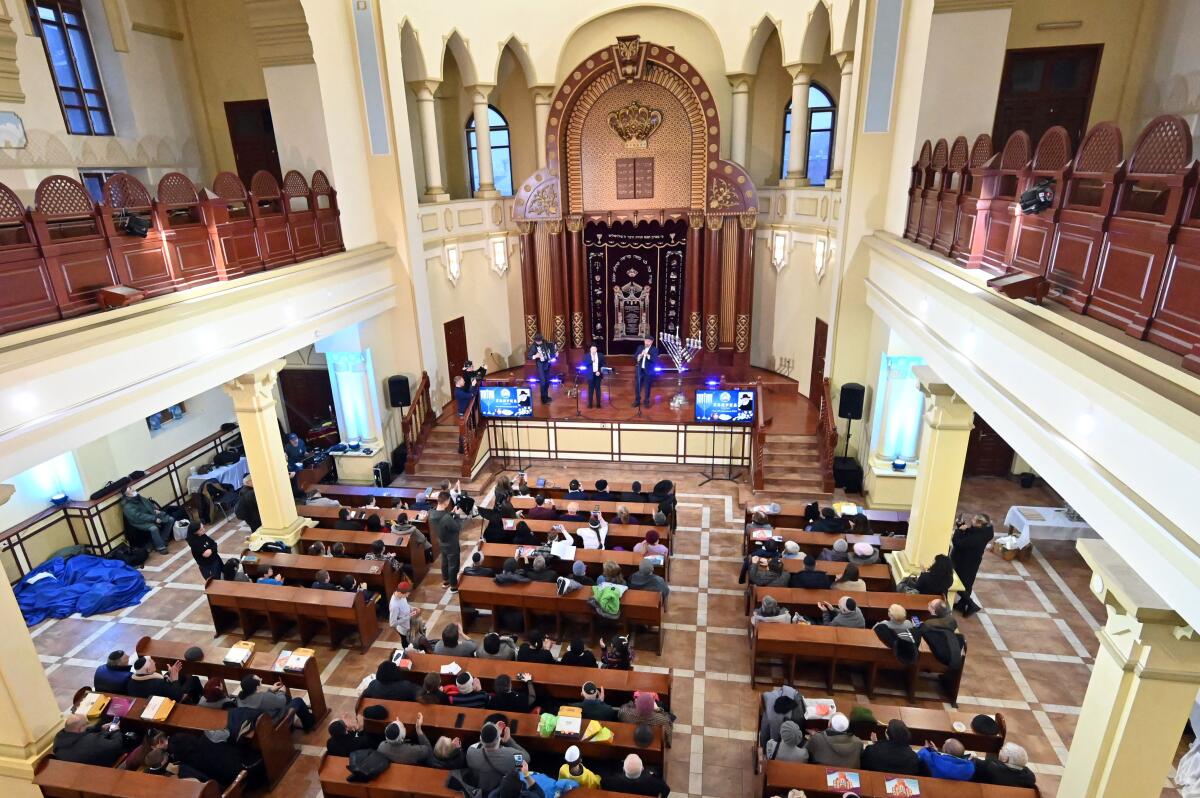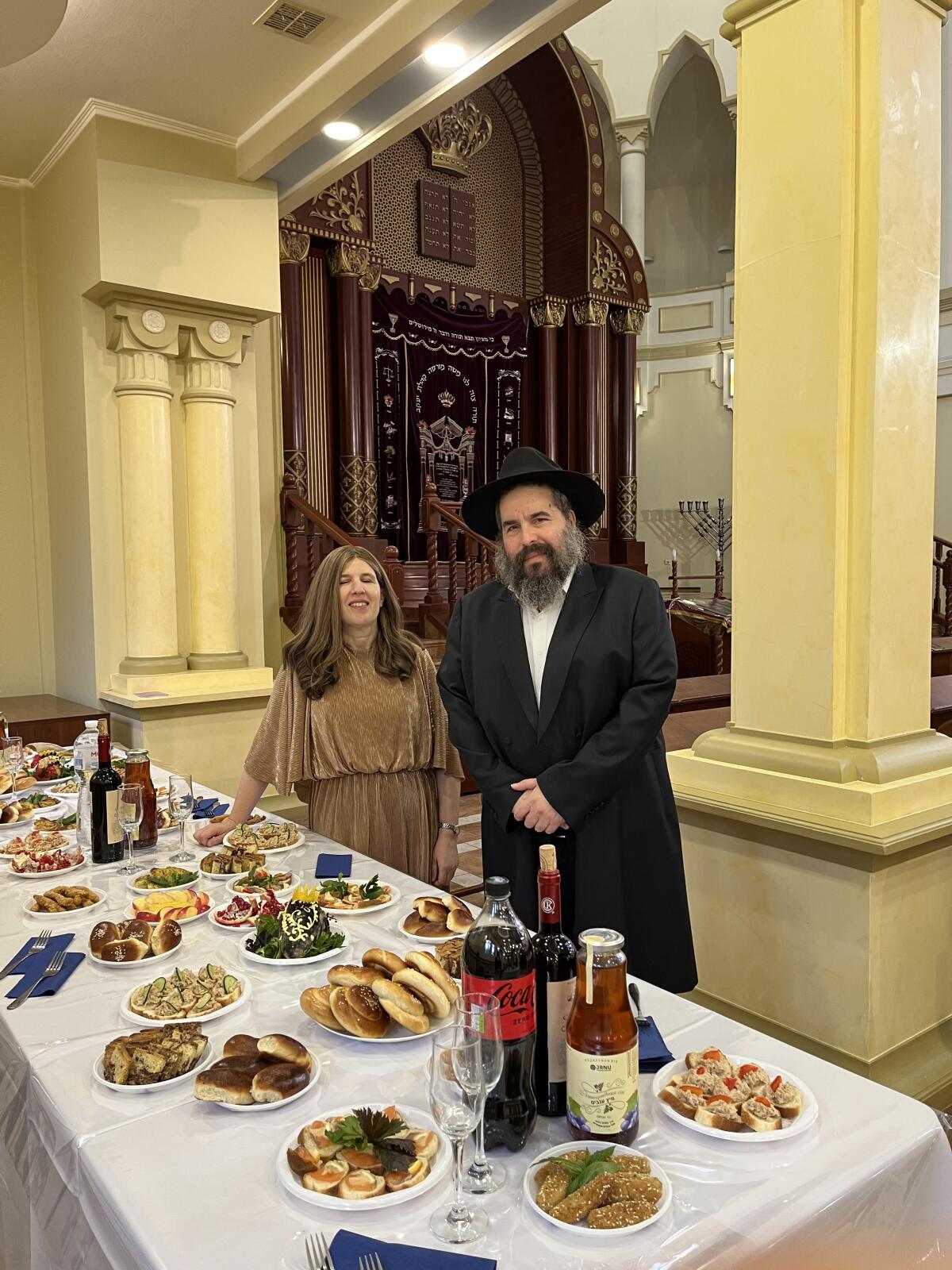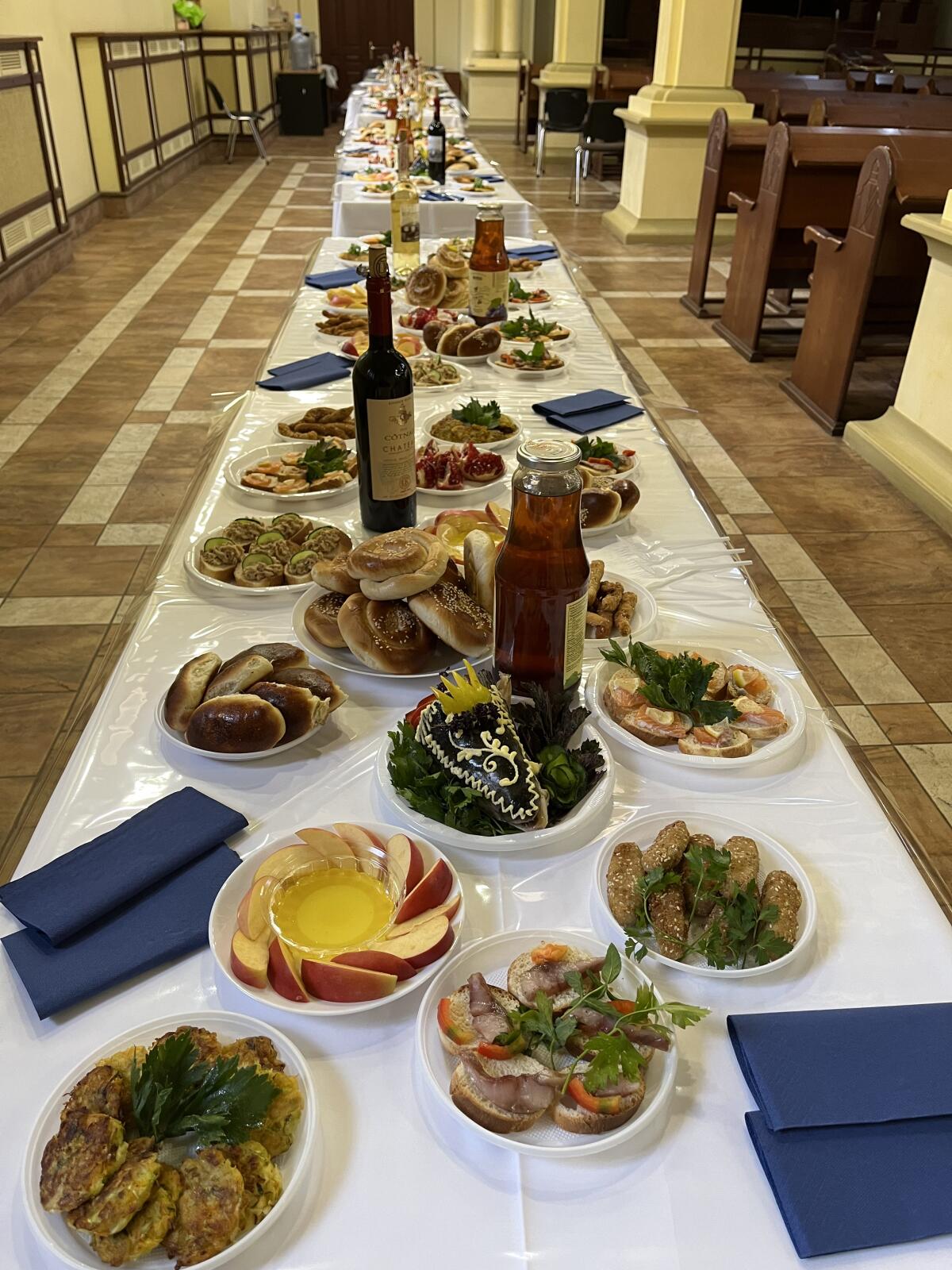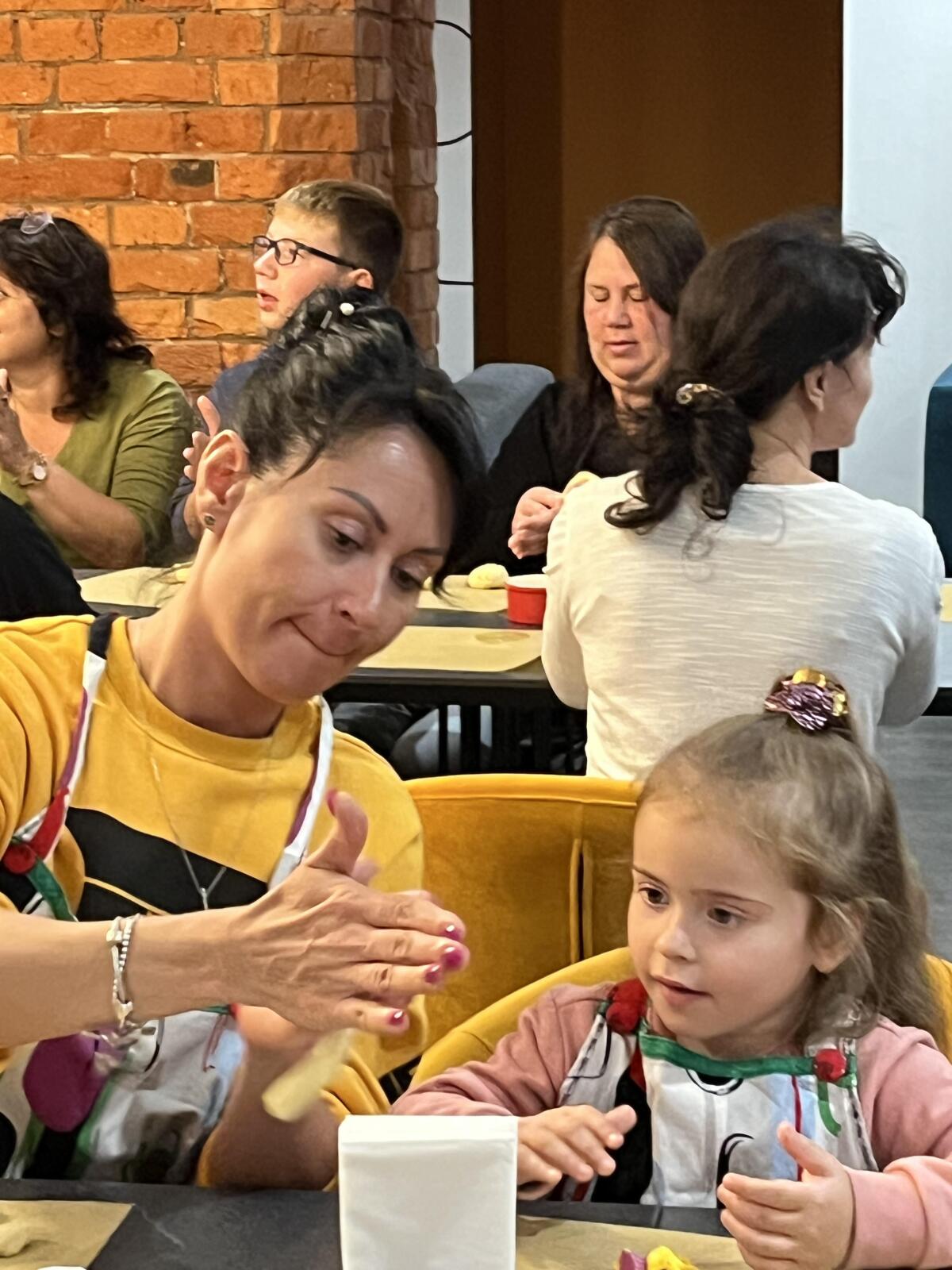Rosh Hashana in wartime: As missiles fall, Jews in Ukraine find hope, even joy

- Share via
KHARKIV, Ukraine — The tables were laid, the candles were lighted, and the last rainy-day light was dying as prayerful voices rose toward the synagogue’s ornate domed ceiling. The Jewish New Year was beginning.
In Ukraine’s battered second city, Kharkiv, the Rosh Hashana holiday, which started Friday at sundown and ends Sunday evening, holds special meaning in this second grinding year of Russian President Vladimir Putin’s war.
“In darkness we find light,” said Rabbi Moshe Moskovitz, the city’s 59-year-old chief rabbi, who presides over Kharkiv’s landmark synagogue, the largest in the country.
Only 25 miles from the Russian frontier and seconds away from Russian missile range, Kharkiv was vulnerable from the war’s first moments. In months that followed, bombs rained down on the northeastern metropolis almost daily, wrecking hundreds of buildings, killing and maiming civilians and scattering much of the prewar population of 1.4 million people.
The pattern still recurs. Air alarms wailed Friday night, a few hours after prayers and a festive meal ushered in the New Year holiday. On Saturday, the holiday’s first full day, a volley of cruise missiles struck the city, injuring five people.
“Our enemy wants us to be hiding and crying in the dark,” Moskovitz said in an interview. “But for centuries we have celebrated our holidays in time of war and hardship — this is so meaningful to us.”
During the onslaught that followed Russia’s Feb. 24, 2022, invasion, Kharkiv’s historic Choral Synagogue provided haven to up to 150 people at a time, the last of whom left for other housing only in April of this year.
In the synagogue’s deep, thick-walled cellars, classrooms and storage rooms were repurposed with cots and mattresses, and the kitchens cranked out hundreds of meals a day.
In the siege’s early days, Moskovitz and his wife, Miriam, 54, gave a simple order: Open the gates to anyone needing shelter, Jews and non-Jews alike.

“They fed us, they clothed us,” said Sofia Huz, 90, who spent months living in the synagogue’s basement after her building in the outlying district of Saltivka — now dotted with ruined, blackened high-rises — was struck in the initial wave of Russian bombardment.
Together with her 60-year-old daughter, her 18-year-old granddaughter and their cat, volunteers helped Huz, who is Jewish, reach the synagogue after nearly two weeks of huddling, terrified and freezing, in the basement of a neighboring Saltivka apartment block.
“They saved us,” she said, tearing up. Her daughter, Irina, also crying, nodded in agreement.
“We didn’t have anything — not a coat, not a comb, and they gave us everything,” the daughter said.
For an older generation here, the current war is a reminder of childhood trauma. Sofia Huz was 8 when then-Soviet Kharkiv came under Nazi occupation in World War II. Her small brother was one of an estimated 600,000 Ukrainian Jews who died, many of them shot en masse by Nazi death squads.
“I remember how terrifying it was, the explosions and the bloodshed, and my mother worrying about us all, just as I worry for my granddaughter now,” she said.
Despite everything, Kharkiv remains home to one of Ukraine’s most vibrant Jewish communities — about 25,000 people in all before the invasion, a number that has fluctuated, halved at times, as refugees have fled and again returned home.
For the record:
11:53 a.m. Sept. 21, 2023An earlier version of this story said Kharkiv was part of Russia until Ukraine’s independence in 1991. The Ukrainian city of Kharkiv and Ukraine were part of the former Soviet Union.
But Jewish life in the city, which was part of the former Soviet Union until Ukraine’s independence in 1991, has been painstakingly revived over a span of decades.
When the Moskovitzes arrived more than 30 years ago, sent by the worldwide Hasidic movement Chabad — he is from Venezuela, and she from Australia — many Kharkiv residents were only vaguely aware of sometimes-hidden Jewish ancestry, and did not know Jewish customs and traditions. During Soviet times, the more than 100-year-old synagogue was taken from the Jewish community and used for a time as a sports hall.
One Kharkiv man who ignored his family’s entreaties and enlisted in the Ukrainian army after the invasion confided a secret to his adult son before being sent to the front line: I am a Jew, and if I’m killed, give me a Jewish burial.
Two months ago, the son came to Moskovitz to say that the remains of his father, missing for months in territory that fell into Russian hands but was subsequently reclaimed by Ukrainian forces in the fall last year, had finally been identified by DNA testing. The rabbi summoned a minyan — a group of 10 Jewish men over the age of 13, for purposes of public worship — and they buried the man next to his Jewish grandmother, in accordance with his wishes.
Another Kharkiv recruit headed for the battle zone asked Moskovitz to tutor him on blowing the shofar, the ram’s horn that is sounded for Rosh Hashana and a few other occasions.
Ukrainian President Volodymyr Zelensky is Jewish — a fact that has never stopped Putin from falsely proclaiming that his war aim is to “de-Nazify” the country. On Thursday, with the holiday approaching, Zelensky met in Kyiv with rabbis from across Ukraine, nearly three dozen in all, and presented combat citations to a group of Jewish soldiers.

Part of Moskovitz’s pastoral mission involves visiting injured troops at Kharkiv’s military hospital, invariably flooded with gruesome casualties because the city lies only 125 miles from Bakhmut, the scene of some of the war’s bloodiest fighting. There, he offers comfort to the wounded of all religions.
The milestones of Jewish life, too, are marked amid the chaos of war. Last year, a heavily pregnant congregant, knowing she would give birth to a boy, asked that he be circumcised — and that the bris be held on the eighth day of his life, as tradition demands. But there were no mohels left in Ukraine.
The rabbi of Mariupol, the port city that was leveled and eventually captured by Russian forces earlier in the war, had taken refuge in Israel. But he made the perilous journey to Kharkiv, flying to the Moldovan capital, Chisinau, and traveling 17 hours overland to perform the ritual. Hours after he left, there was another missile attack.
Coming of age continues as well. The Moskovitzes’ son Yisrael — one of the couple’s 12 offspring — will turn 13 in two weeks, coinciding with the festival of Sukkot, and is to have his bar mitzvah. Rosh Hashana marks the start of a crush of upcoming holy days, including Yom Kippur, the Jewish calendar’s most important occasion.
For Kharkiv’s Jewish community, as elsewhere in Ukraine, the holidays are cause for rejoicing, though celebrations are also suffused with a sense of sorrow and loss. Each correlates with another season of war, in a battle that has gone on longer than many had imagined.
But many believe that in some ways, this war has brought people closer — not only the Jewish community, but also Ukrainian society as a whole.
“There’s been so much destruction, but on the other hand we see so much good, so much light that people can bring by helping one another,” Miriam Moskovitz said. “Ordinary people become extraordinary.”
Already since the fighting began, there have been two springs, and two Passovers, marking the Jewish escape from slavery in Egypt. The rabbi’s wife ruefully recalled what she termed this year’s “express Seder” — the lengthy liturgical meal that this time was held in rapid-fire haste so people could hurry home before curfew.
“Especially at these holidays, people need an anchor; they need to feel some kind of security,” said Miriam Moskovitz. “They need identity, they need family — they need community.”
For last year’s Hanukkah holiday, the Festival of Lights that fell amid tight blackout conditions, the city’s mayor invited the Jewish community to place their large menorah, which normally blazed in full view on the street, in a cavernous subway station instead and hold festivities there.
At the lighting ceremony, a non-Jewish man buttonholed the rabbi to thank him for procuring badly needed heart medicine for him during a spate of intense bombardment.
And last year’s Rosh Hashana is a poignant memory. With the holiday’s connotations of renewal and hopes for the year to come, “we all hoped then that this would be the year that the war would end,” Miriam Moskovitz said.

Nonetheless, those hopes are being revived. The festive tables were laden with sustenance symbolizing hopes for a sweet New Year: pomegranates, apples to be dipped in honey.
A short distance from the synagogue, a community center supported by the U.S.-based Joint Distribution Committee honored culinary customs with a cooking class aimed at the community’s needy.
“We continue to have our Jewish traditions, and have them together,” said Nika Symonova, one of the event’s organizers.
Hours before the start of the holiday, Anya Ladchenko, 41, brought her 4-year-old daughter, Sofiya, to learn to make challah, the yeasty braided bread baked in rounds for Rosh Hashana.
“Before, I didn’t know anything about how to celebrate the Jewish holidays,” said Ladchenko, whose home was destroyed last year. “Now, I want to learn, and to teach her too.”
More to Read
Sign up for Essential California
The most important California stories and recommendations in your inbox every morning.
You may occasionally receive promotional content from the Los Angeles Times.













